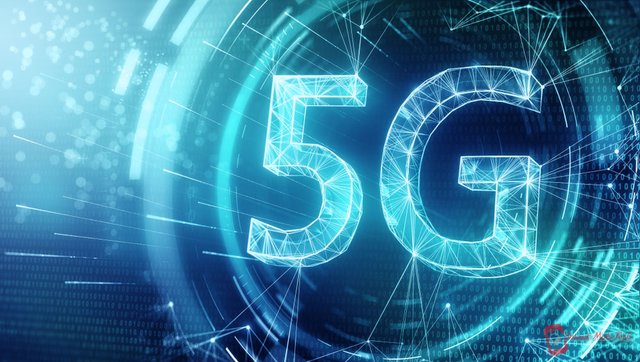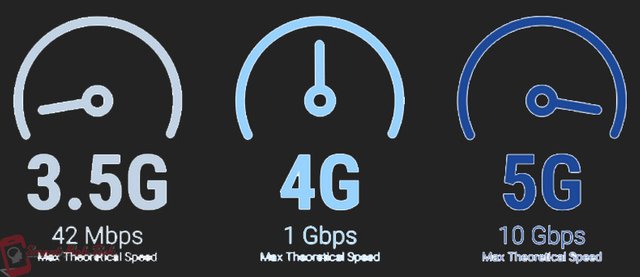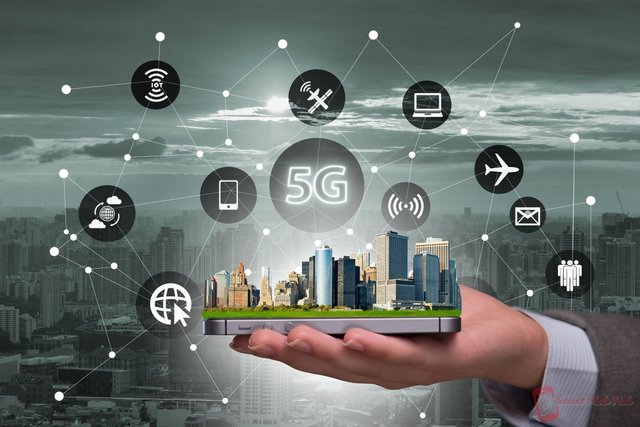What Is This 5G Everybody Keeps Talking About? Will It Help Us? - Now Explained Simply

Probably by now you have heard a lot about 5G, especially in the news. I’ll explain it to you very simply, and tell you exactly what 5G or '5th Generation Network' is, how does it work and how can it benefit us, where will it come and are there any negatives or cons.
5G, the next generation of mobile internet connectivity was launched on April 3 in few areas of Chicago and Minneapolis and will continue to expand throughout 2019, yet few are aware of what is it!
It has brought the speed 10 or even 20 times faster than the current 4G networks, with rapid data upload and download speeds, greater bandwidth, and more steady connections.
But the question arises that what change has it brought for us.
So what is 5G?
To sum it up, it is the fifth generation of mobile internet connectivity enabling us to do everything we do on our mobile phones faster than ever before.

Max Theoretical Speed of 5G is 10Gbps vs 1Gbps of 4G
It is an improved use of the radio spectrum that allows more devices to access the mobile internet at the same time.
How does it help us?
According to Ian Fogg from OpenSignal, a mobile data analytics company, “Whatever we do now with our smartphones we’ll be able to do faster and better,”
“Think of smart glasses featuring augmented reality, mobile virtual reality, much higher quality video, the internet of things making cities smarter.
“But what’s really exciting is all the new services that will be built that we can’t foresee.”
Likewise, 5G can be a significant tool for autonomous vehicles to communicate with each other and read live map and traffic data.
To put it more plainly, the mobile gamer when presses a button on a controller, will see the effect immediately on screen-this means less delay or no latency. Streaming live videos will be quite swift and downloading movies is instantaneous. Video calls should become clearer and less jerky. Wearable fitness devices could monitor your health in real time, alerting doctors as soon as an emergency arises.
How?
Numerous technologies are likely to be applied but no fixed criteria are shaped out yet for all 5G protocols.
Having a frequency range of 3.5GHz to 26GHz and beyond- the magnitude is high but their shorter wavelengths mean their range is lower thus more easily blocked by physical objects.
As a solution, groups of smaller phone poles, installed closer to the ground are transmitting “millimeter waves” amidst greater number of transmitters and receivers. This in turn means greater density of usage. However, it’s high cost has deterred telecom companies for now.
#5G: What’s new?
Right now 5G is used by network operators as a way to improve capacity on existing 4G to establish a stable service for the users. Though it is a brand new radio technology, the speed depends on the spectrum band the 5G technology runs on and how much has been invested in new masts and transmitters by the carrier.
Speed
5G is expected to reach a speed of 1Gbps as fastest current 4G mobile networks offer about 45Mbps (megabits per second) on average. Chip maker Qualcomm reckons 5G could achieve browsing and download speeds about 10 to 20 times faster in real-world conditions.
Till now 5G networks coexist with 4G LTE networks. Separate 5G networks can operate within very high frequencies (30GHz) and can easily reach gigabit plus browsing speeds as standard. But we have to wait for few years.
End of breakdowns in service?
With the increasing usage of data every year, the current spectrum bands are becoming jam packed. It eventually leads to breakdowns in service specially when many are trying to connect mobile services at the same time. 5G is better at tackling numerous devices together from mobiles to equipment sensors, video cameras to smart street lights.
Compatible with your old smartphone?
Sorry to say but no it will not be compatible. Smartphones came into market before 4G was introduced back in 2009/10. This means the infrastructure was present ahead to support 4G though the consumers were exasperated as they felt they were paying more in subscriptions for an irregular service.
However, this time the phone sets will be launched once the network is available worldwide. These next generation phones will be able to switch seamlessly between 4G and 5G networks for a more stable service.
Availability
Sadly, the 5G network will primarily be available in urban areas. The rural areas that already suffer from lack of signal and low data speeds is unlikely to benefit from 5G. As it will operate on high-frequency bands – to start with at least – that have a lot of capacity but cover shorter distance.

5G won’t be coming to the rural areas very soon
Lower-frequency bands (600-800Mhz typically) are better over longer distances, so network operators will concentrate on improving their 4G LTE coverage along with 5G roll-out.
It is possible that the government subsidy may encourage network operators to go to these places.
Future of fixed line services?
An excessive investment in fiber optic and copper wire fixed line broadband will discourage telecom companies to give up soon. Domestic and office broadband services will be primarily fixed line for many years to come, although so-called fixed wireless access will be made available in tandem.
No matter how much the wireless connectivity develops, many prefer the stability and certainty of physical wires.

The future is wireless
Many think of 5G mobile as a complementary service for when we’re out and about, interacting with the world around us. It will also facilitate the much-heralded “internet of things”.
Is 5G harmful?
According to The International Agency for Research on Cancer (IARC), radio-frequency fields are listed as possibly carcinogenic to humans. As pointed out in its article, this is the same classification given to coffee. So there is no need to panic, yet.
In the same article, the FDA is quoted saying that it “continues to believe that the current safety limits for cellphone radio-frequency energy exposure remain acceptable for protecting the public health.” For now, there appears to be no risk to health from the radio waves produced by phones and towers. At least no more than already existed.
Source: 5G: What Is It and How Will It Help Us
Pls do follow me, i follow back everyone and upvote
5G is going to use millimeter waves that are outright deadly to all biology, that's plants animals and humans. These are the same military frequencies used for crowd control and radar, even through the wall radar so it can be used to see through walls. There are no industry studies to prove it is safe and literally thousands of studies proving how dangerous it is.
To bypass FCC regulations on safe exposure levels they just changed their standards and raised them to what's been agreed by industry experts as very dangerous levels, they also changed the regulations so the FCC can't held accountable for any deaths cancers or other damage.
5G is very hazardous but people are too stupid to look into it, they just want instant gratification. This technology will kill millions.
thanks!!
Thank you for the info. You manage to simplify it perfectly.
Posted using Partiko Android
Congratulations @amanda46536! You have completed the following achievement on the Steem blockchain and have been rewarded with new badge(s) :
You can view your badges on your Steem Board and compare to others on the Steem Ranking
If you no longer want to receive notifications, reply to this comment with the word
STOPVote for @Steemitboard as a witness to get one more award and increased upvotes!
Resteemed by @resteembot! Good Luck!
Check @resteembot's introduction post or the other great posts I already resteemed.